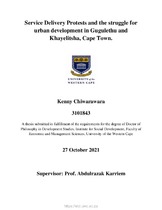Service delivery protests and the struggle for urban development in Gugulethu and Khayelitsha, Cape Town
| dc.contributor.advisor | Karriem, Abdulrazak | |
| dc.contributor.author | Chiwarawara, Kenny | |
| dc.date.accessioned | 2021-11-02T09:13:47Z | |
| dc.date.issued | 2021 | |
| dc.identifier.uri | http://hdl.handle.net/11394/8545 | |
| dc.description | Philosophiae Doctor - PhD | en_US |
| dc.description.abstract | This study assesses the role of service delivery protests (SDPs) in promoting access to services such as water, electricity, and housing in Gugulethu and Khayelitsha, Cape Town. The study was conceptualised within the context of escalating frequency and scale of SDPs in South Africa. Although the first decade of democracy saw a decline in protests, some groups and movements protested. However, since 2005, when SDPs took national prominence, South Africa has experienced soaring levels of dramatic protests. This frequency of SDPs invites research. Why have SDPs (e.g., for housing, water, and electricity) increased despite the government promising a ‘Better life for all’ for nearly three decades, and how have they unfolded? | en_US |
| dc.language.iso | en | en_US |
| dc.publisher | University of the Western Cape | en_US |
| dc.subject | Service delivery | en_US |
| dc.subject | Protests | en_US |
| dc.subject | Western Cape | en_US |
| dc.subject | Gugulethu | en_US |
| dc.subject | Khayelitsha | en_US |
| dc.subject | Cape Town | en_US |
| dc.subject | Spontaneous protests | en_US |
| dc.subject | Urban development | en_US |
| dc.subject | Social Movement Theory | en_US |
| dc.title | Service delivery protests and the struggle for urban development in Gugulethu and Khayelitsha, Cape Town | en_US |
| dc.rights.holder | University of Western Cape | en_US |

